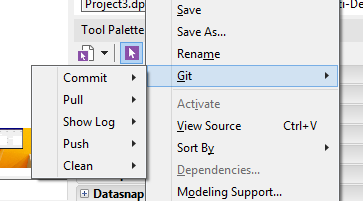Live Templates have been in Delphi and C++Builder since BDS2006 and they offer a way to automate a lot of routine typing in the code editor, especially if you put in the effort to both tailor the standard templates and create new templates. There are plenty of other, better, resources about Live Templates, like this, and this, so I don’t intend to go into how to write your own.
However, customisations like this are a dual-edged sword: yes, they can make you more productive, but sit down in front of a machine that doesn’t have them and suddenly you’re even less productive than before you started. This has been happening more and more frequently to me as I find myself using Delphi in multiple VMs on multiple machines in multiple physical locations.
My Live Templates are in version control, so for awhile I was just trying to remember to checkout the latest versions prior to starting the IDE, but I’d forget more often than not, so while I intend keeping them in version control, this isn’t the solution I’m looking for.
What I want is a way to make sure my Live Templates are kept up to date on every machine, physical or virtual, with no ongoing intervention on my part. You know, kind of like Dropbox?
Well, actually, exactly like Dropbox.
When this realisation hit me, I got very excited. I already had Dropbox installed in most of the VMs I was using, so it should be a relatively easy thing to tell it to sync the xml files RAD Studio uses to store Live Templates, right?
Yes… and no.
Getting Dropbox to sync them is stupidly easy. I created a templates folder in my Dropbox folder and copied all my custom Live Templates into it (actually, checked them out of version control, but that’s beside the point). I gave Dropbox some time to do its magic and Bob’s your father’s brother, my templates are on all my machines!
Now I just have to tell all my instances of Delphi to look in this dropbox/templates folder. That should be as easy as setting the path to my Live Templates folder in the IDE options, and….err, hang on, there’s no IDE option for that?
OK Delphi, you’re gonna make me earn this I see.
So let’s have a look. In a default installation, the standard Live Templates that come with RAD Studio are stored in:
C:\Program Files\Embarcadero\RAD Studio\9.0\ObjRepos\en\Code_Templates
In addition, the IDE will look for any custom Live Templates you create in:
C:\Users\mgroves\Documents\RAD Studio\code_templates
Hmmm, that ObjRepos bit in the first path gives me an idea.
Attempt 1: There is an IDE option for setting a Shared Object Repository, really meant for sharing common forms and projects across a team so they are visible when you use File | New. This was there long before Live Templates were even a glimmer in someone’s eye, but still, maybe it’ll work for everything under that directory?

Unfortunately not. This could still be useful for sharing Object Gallery forms and projects across machines, if you use that feature, but no luck for templates.
Attempt 2: I didn’t really expect this one to work, but it was so easy to try I thought I’d quickly rule it out. I created a Windows Shortcut to my LiveTemplates DropBox folder inside my C:\Users\mgroves\Documents\RAD Studio\code_templates folder. Windows Explorer was happy, but the IDE was not fooled.
Attempt 3: OK, being polite didn’t get me anywhere, so let’s try a different tack: regedit. I spelunked around in the IDE registry keys for quite awhile, sure that I would find an option to change to tell the IDE where to look for user-defined Live Templates. It may well be there, but I didn’t find it.
I gave up and went and had a coffee. Something about Attempt 2 with the shortcut was nagging at me. I vaguely remembered something about a later Windows version getting a feature like Symbolic Links from Unix. Couldn’t remember what they were called, but basically, Shortcuts done properly. When I got back, a quick search revealed that in fact I was right, and that in Windows they were cunningly called….Symbolic Links. Read up on them here, but they are NTFS specific and introduced with Windows Vista. NB: See the comment below from Stefano Moratto about the junction command line tool, that looks like it will probably work for earlier versions of windows such as XP.
You create a Symbolic Link at the command line using mklink. You’ll need Administrator rights to do this, so start up cmd.exe as Administrator, navigate to your user-defined live templates folder (in my case C:\Users\mgroves\Documents\RAD Studio\code_templates) and type the following command:
mklink /D SharedTemplates c:\Users\mgroves\Dropbox\templates
The params are:
/D – tells it to create a symbolic link to a directory rather than a fileSharedTemplates – the name of the symbolic link that will be createdc:\Users\mgroves\Dropbox\templates – the directory to which the symbolic link should point. In this case, my templates folder being sync’d by Dropbox.
Do all that properly and you should see a message like this:
symbolic link created for SharedTemplates <<===>> c:\Users\mgroves\Dropbox\templates
Now, if my theory works, as far as RAD Studio is concerned, the contents of my Dropbox templates folder is actually in a subdirectory of C:\Users\mgroves\Documents\RAD Studio\code_templates called SharedTemplates.

Indeed, my theory did work. Firing up the IDE shows that all the templates in that dropbox/templates directory are available when you hit Ctrl-J, and Dropbox takes care of the hard work of keeping all my machines up to date.
This will probably also work if you’re using some other service apart from Dropbox. It could also be a way to get multiple people on your team sharing a single set of templates from a shared network folder, as a few people have asked about.
Oh, and if you don’t already use Dropbox, then consider signing up using this link and we both get an extra 500MB of space (yes, I’m shameless, I know, but I shove a LOT of stuff into dropbox).




